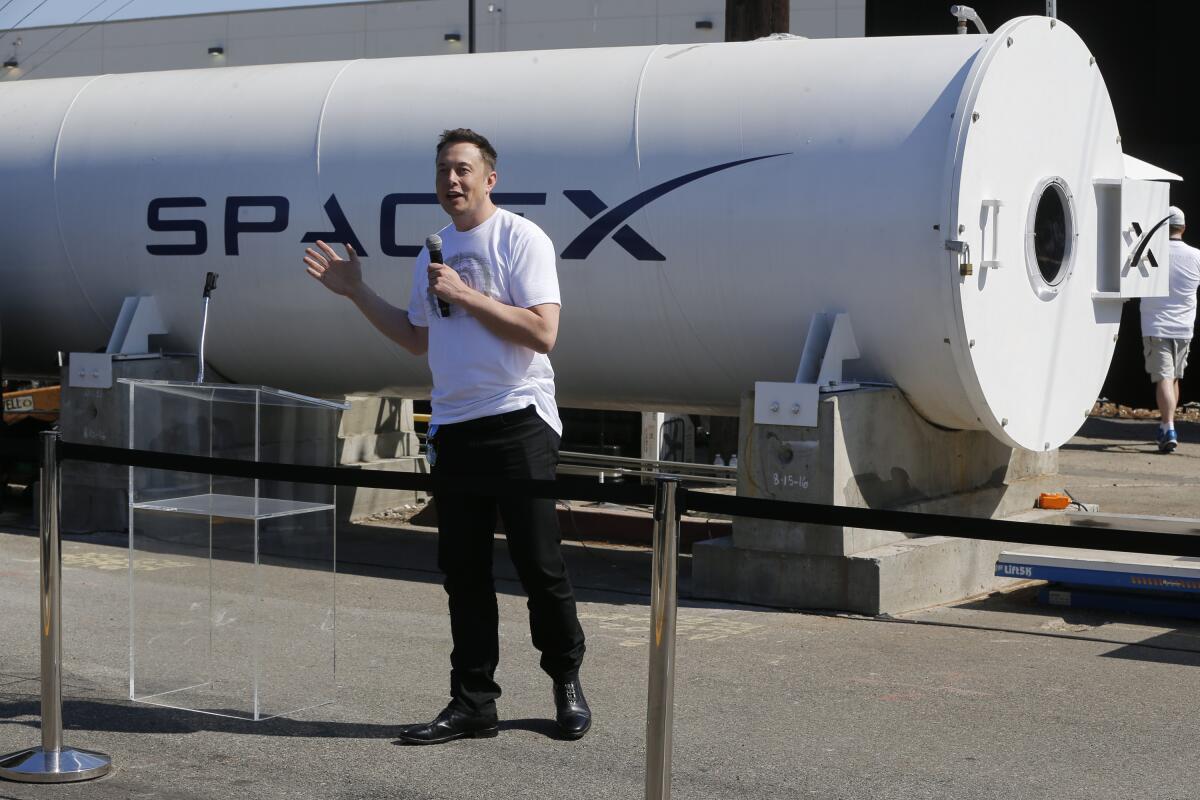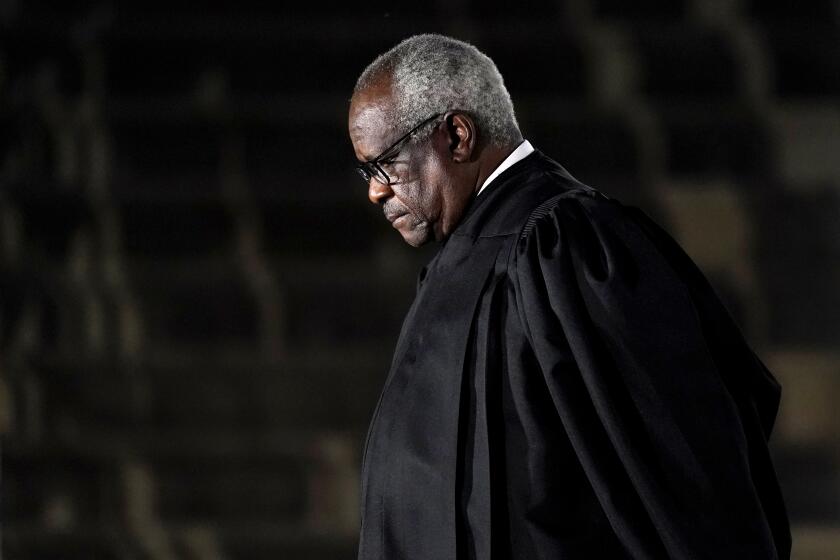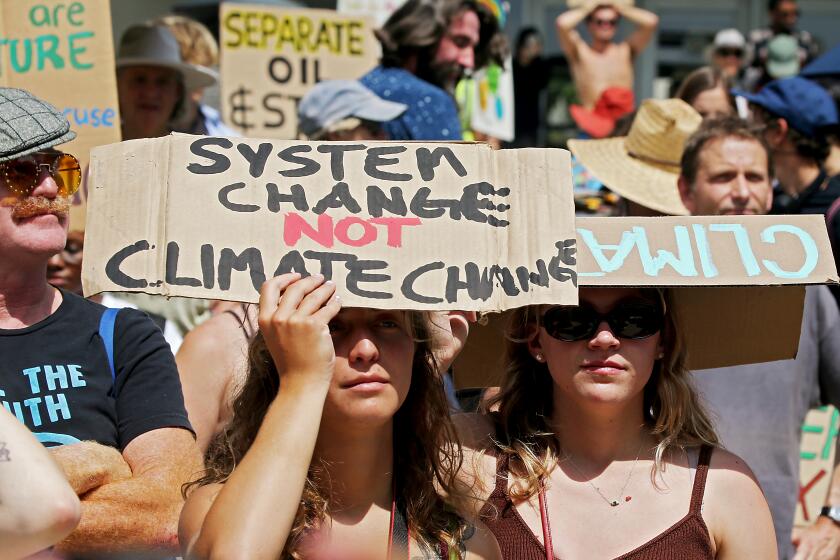Column: Elon Musk is suing to stop the government from enforcing labor laws. The Supreme Court might agree with him

Few business leaders have taken to heart more than Elon Musk the old lawyer’s saw that if you don’t have the facts or the law on your side at trial, pound the table.
Musk has truculently flouted regulatory standards of all varieties as the guiding spirit of companies such as Twitter, Tesla and SpaceX — keeping factories open despite pandemic shutdown orders, allegedly committing securities fraud by issuing misleading tweets about his investment plans and ignoring government safety recommendations for self-driving automotive technologies.
As I’ve reported, Musk has gotten his way with regulators and municipal officials “through bluster and intimidation.”
This is an effort by a group of lawyers who are foes of the administrative state and the New Deal-era legislation that created the NLRB and the SEC to essentially end enforcement of those statutes.
— Catherine Fisk, UC Berkeley
Now he’s trying what may be his most audacious flip-off to regulators yet:
Faced with an accusation by the National Labor Relations Board that SpaceX improperly fired nine employees in 2022, among other illegal acts, the company, which is controlled by Musk, filed a lawsuit in federal court in Texas to declare the NLRB’s action — indeed, the board itself — unconstitutional.
Get the latest from Michael Hiltzik
Commentary on economics and more from a Pulitzer Prize winner.
You may occasionally receive promotional content from the Los Angeles Times.
There’s more to it than that, however. The SpaceX lawsuit takes direct aim at the very enforcement structure of the NLRB, through which appointed administrative law judges weigh unfair labor practice charges laid against employers and recommend penalties to be imposed by the board itself.
The company’s argument is that because the judges are largely immune from being fired other than “for good cause,” their role in enforcement deprives accused parties of their constitutional right to trial by jury.
It also asserts that the board’s power to act as judge and jury in employment cases and the members’ immunity from being removed by the president violates the separation of powers principle in the Constitution. In sum, SpaceX claims that it’s being held “subject to unlawful proceedings before an unconstitutionally structured agency.”
More such claims are in the offing from businesses facing regulatory scrutiny. According to a transcript obtained by Bloomberg, grocery chain Trader Joe’s made the same argument at a Jan. 16 NLRB hearing on charges that it engaged in illegal union-busting by retaliating against unionization advocates among its workers.
Clarence Thomas needs rich friends because he can’t live on $285,000 a year. Too bad about the rest of us.
What are these companies up to? The SpaceX claims are unusual, but they’re not unique in recent regulatory litigation. Similar claims have been brought against the Securities and Exchange Commission and the Consumer Financial Protection Bureau.
“This is an effort by a group of lawyers who are foes of the administrative state and the New Deal-era legislation that created the NLRB and the SEC to essentially end enforcement of those statutes,” says Catherine Fisk, an employment and labor law authority at UC Berkeley law school.
Unable to challenge the laws themselves — they’ve been upheld by Supreme Court decisions dating back to the 1930s — or the regulations directly, Fisk told me, “they’re arguing that the administrative structure is in some part unconstitutional.”
Before delving into the details of the SpaceX lawsuit, let’s examine the NLRB’s enforcement case. The agency says SpaceX illegally fired the nine workers for circulating an open letter complaining about Musk’s “repeated conduct of issuing inappropriate, disparaging, sexually charged comments on Twitter,” which he owns. The silence of SpaceX management about Musk’s conduct, the letter said, allowed a “culture of sexism, harassment and discrimination” to “pervade ... the workplace.”
The NLRB filed a formal complaint against SpaceX on Jan. 3, encompassing not only the firings but charges that it illegally interrogated workers and conducted illegal surveillance of their activities. The agency scheduled a hearing on the charges before an administrative law judge for March 5 in Los Angeles.
The very next day, SpaceX filed its lawsuit.
By some measures, SpaceX’s response to the NLRB charges might be interpreted as overkill. Even if it’s found to have committed all the violations, the consequences are meager. The NLRB can’t levy monetary fines.
It can order back pay and reinstatement for workers who have been wrongly discharged, but those wouldn’t make much of a dent in the finances of a company that was reported to have brought in $8 billion in revenue last year from government and commercial contracts.
Elon Musk has gone full antisemite, raising questions about the future of his companies and their relationships with commercial and government entities.
Moreover, SpaceX hasn’t yet come before an administrative law judge over the NLRB charges, much less having them voted on by the full board. Its lawsuit, then, looks like a shot across the NLRB’s bow. The company asks the trial judge in Texas to block the NLRB’s case against it, declare that the NLRB’s structure is unconstitutional, and permanently prohibit the agency from pursuing unfair labor practice charges via administrative law judges.
That points to the conclusion that this case, and others like it, aim to exploit the veer to the right seen throughout the federal judiciary generally and the Supreme Court in particular.
This variety of attack on regulations went out of fashion in the 1930s, Fisk observes. The Supreme Court, which had overturned a sheaf of New Deal initiatives as well as state minimum wage laws, turned back to the middle in the face of rising public disdain and the court-packing scheme of Franklin Roosevelt.
FDR ultimately abandoned his proposal, but after 1936 the court ceased ruling against the New Deal — upholding the National Labor Relations Act, which created the NLRB, in 1937.
“For 85 years, those arguments weren’t made,” Fisk says, “because lawyers knew that they would get nowhere with them — they might even get sanctioned. The Supreme Court signaled that it was up to Congress to design regulatory structures.”
But today’s Supreme Court isn’t your great-grandfather’s Supreme Court. “The Supreme Court has given lawyers reason to think that they might be able to invalidate part or all of these statutes as being unconstitutional.”
As recently as last week, a majority of justices appeared ready to overturn or at least pare back the so-called Chevron doctrine, the nearly 40-year-old principle that courts should defer to agencies’ interpretations of their governing laws as long as those interpretations aren’t plainly unreasonable.
Right-wing hacks on the 5th circuit federal appeals court, emboldening medical charlatans, questioned the FDA’s advice not to take ivermectin for COVID-19.
Overturning the doctrine, as industry litigants urged the court to do during oral arguments Jan. 17, could sap regulatory agencies’ ability to base their rule-making on expert advice.
Although Congress could theoretically overcome any regulatory problems created by an adverse court ruling by amending the laws in question, that’s not a good bet given the profound dysfunction reigning these days on Capitol Hill. The industries will have achieved their goals for years into the future.
That brings us to Musk’s litigation strategy. SpaceX filed its lawsuit against the NLRB not in Southern California, where the company is headquartered, or Washington, D.C., where the NLRB maintains its main office, but in federal court in Brownsville, Texas, a judicial outpost on the Mexican border. This reflects the practice of filing anti-government lawsuits in remote federal courtrooms in Texas, where plaintiffs have a good chance of drawing a right-wing judge.
On the face of it, that tactic may have failed in this case, because the Brownsville court has two judges, one of whom was appointed by Donald Trump and the other by Barack Obama, and the SpaceX case was assigned to Rolando Olvera, who was Obama’s appointee.
SpaceX, however, is playing a longer game. Any appeal from the Texas federal court would go to the extremely conservative U.S. 5th Circuit Court of Appeals, which I’ve described in the past as “the hackiest of hack-ridden federal courts.”
The New Orleans-based appellate court upheld Texas’ malevolent SB 8 antiabortion law in 2022, for example, after which the Supreme Court allowed the law to go into effect.
Last year it partially endorsed a ruling by federal Judge Matthew Kacsmaryk of Texas narrowing access to the abortion drug mifepristone. Kacsmaryk’s ruling was based on a tendentious and long-abandoned reading of an antique 1873 law, but that was enough for the issue to come before the Supreme Court, which has the case on its docket this year.
More to the point, the 5th Circuit has implicitly endorsed the practice of challenging regulations by taking aim at the constitutionality of regulatory agencies. It did so in a case targeting the Consumer Financial Protection Bureau brought by the payday lending industry, which has long been in the CFPB’s crosshairs.
The oil industry knew it was responsible for global warming, and lied about it for decades. California is right to look for ways to make them pay in court.
A 5th Circuit panel composed of three Trump-appointed judges ruled the bureau’s funding mechanism unconstitutional; the government appealed that ruling to the Supreme Court, which heard oral arguments on Oct. 3 but hasn’t yet ruled.
The most important 5th Circuit case from the standpoint of SpaceX and Trader Joe’s, and any other businesses that chose to follow in their wake, is Jarkesy vs. SEC.
That case was brought by a hedge fund operator who was hit with $1 million in fines and penalties for fraud by the Securities and Exchange Commission in 2013. The 5th Circuit ruled against the SEC in 2022, finding that it was an unconstitutional breach of Jarkesy’s right to trial by jury for an administrative judge at the SEC to have ruled on Jarkesy’s crime and imposed the penalties, even though they were later approved by the commission itself.
The government appealed to the Supreme Court, which heard oral arguments on Nov. 30 but hasn’t issued a decision. SpaceX’s position draws closely from the 5th Circuit’s ruling in Jarkesy, which is cited no fewer than 13 times in SpaceX’s 25-page lawsuit.
The NLRB has called foul on SpaceX’s choice of venue, calling the company’s rationale for filing in Brownsville “less than paper thin.” The allegedly unlawful conduct of SpaceX took place entirely at the company’s headquarters in the Southern California enclave of Hawthorne, and nothing actually happened in Texas. The government has asked Olvera to transfer the case to federal court in Los Angeles, but he hasn’t yet ruled.
Put it all together, and the SpaceX lawsuit bears watching.
As I’ve written before, conservative federal judges, many of them appointed by Trump, have the power to move the country to the far right for decades to come, eroding reproductive health care, eviscerating gun control laws and making life more difficult for ordinary Americans depending on the federal government to protect their rights. Elon Musk, pursuing his own personal interests, is urging them to keep at it.
More to Read
Get the latest from Michael Hiltzik
Commentary on economics and more from a Pulitzer Prize winner.
You may occasionally receive promotional content from the Los Angeles Times.











